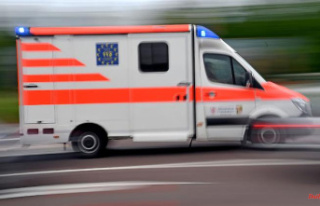The energy crisis and the exploding prices are topics in the state parliament on Wednesday. The opposition is already making it clear that, in their view, the federal government's relief package is not enough.
Schwerin (dpa/mv) - Immediately before the state parliament debate planned for Wednesday on overcoming the energy crisis, the opposition factions made it clear that they expect the state government to take further steps to cut costs. "The federal government has put together a relief package. But we now need more of our own initiatives from the state," said FDP parliamentary group leader Renè Domke on Monday in Schwerin. In addition, the red-red state government must clarify who should benefit from the 30 million euros in the state's hardship fund.
A question that SPD faction leader Julian Barlen was unable to answer on Monday. The details of the fund, the establishment of which was decided at the state energy summit at the end of August, are currently being clarified. It is important that the support granted in addition to the federal aid can come quickly. He assumes that primarily needy citizens will be helped with the state money. There were no specific stipulations in the summit resolution, but there was talk that municipalities and companies could also receive grants from the hardship fund, which is intended to supplement a federal protective shield.
CDU parliamentary group leader Franz-Robert Liskow called on Prime Minister Manuela Schwesig (SPD) to use her contacts in the Chancellor's Party SPD to get citizen-friendly and pragmatic solutions off the ground. "We want to take away the public's fear of supply bottlenecks and rising costs. We won't achieve that with the gas levy," said Liskow. He renewed his proposal for an energy price cap that would make oil, gas and electricity no more than 30 percent more expensive than before the Russian invasion of Ukraine. The difference to the real costs should be financed from the federal budget. He also called for shorter approval procedures for wind farms and an accelerated expansion of the power grid. "Since 2016, the expansion of renewable energies in Mecklenburg-Western Pomerania has almost come to a standstill," complained Liskow.
The Greens want to use the general debate after Schwesig's government statement on Wednesday to focus more on the social consequences of the energy crisis. "The enormous price increases are hitting people very hard, especially here," said parliamentary group leader Anne Shepley, referring to the lowest level of pensions and income in Germany. "The state government has to do its homework, make it clear where the gaps are that the state must close," said Shepley, justifying her call for a state social summit. In addition, the Greens are pushing with another motion to increase the area used for solar systems in the country. In particular, previously drained moor areas still offer a lot of potential, it said.
The AfD referred to their application, with which they are in favor of the continued operation of coal and nuclear power plants in Germany. She is also calling on the state government to work through the Bundesrat to ensure that the Russian-German Nord Stream 2 gas pipeline is put into operation and that the oil embargo that has been decided is not implemented. "What have the sanctions against Russia brought us? The war is not over. And we are only harming ourselves," said AfD MP Martin Schmidt.












